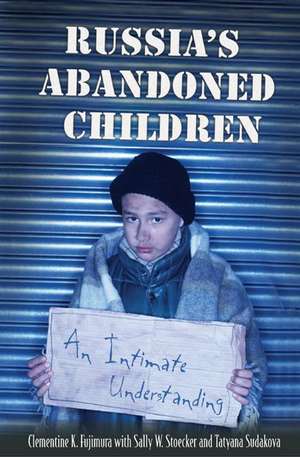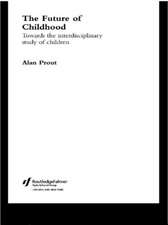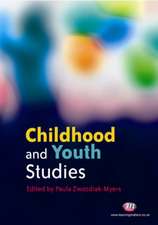Russia's Abandoned Children: An Intimate Understanding
Autor Clementine K. Fujimura, Sally W. Stoecker, Tanya Sudakovaen Limba Engleză Hardback – 29 sep 2005 – vârsta până la 17 ani
Preț: 320.00 lei
Preț vechi: 480.70 lei
-33% Nou
Puncte Express: 480
Preț estimativ în valută:
61.25€ • 66.55$ • 51.48£
61.25€ • 66.55$ • 51.48£
Carte tipărită la comandă
Livrare economică 21 aprilie-05 mai
Preluare comenzi: 021 569.72.76
Specificații
ISBN-13: 9780275979096
ISBN-10: 0275979091
Pagini: 184
Dimensiuni: 156 x 235 x 20 mm
Greutate: 0.43 kg
Editura: Bloomsbury Publishing
Colecția Praeger
Locul publicării:New York, United States
ISBN-10: 0275979091
Pagini: 184
Dimensiuni: 156 x 235 x 20 mm
Greutate: 0.43 kg
Editura: Bloomsbury Publishing
Colecția Praeger
Locul publicării:New York, United States
Notă biografică
Clementine K. Fujimura is an Associate Professor of language and culture studies at the United States Naval Academy, where she teaches Russian and German, culture, and literature courses. She received her doctorate in cultural anthropology from the University of Chicago and has been writing about Russia's homeless children, abandonment, and its cultural concept of childhood since 1991. She has received numerous grants and fellowships in support of her work on homeless children in Russia.Sally W. Stoecker is a Lecturer in ciminology and criminal law, and a candidate of sciences, at Baikal State University of Economics in Irkutsk, Russia. Her reserach focuses on child homelessness, drug addiction of minors, and juvenile crime. She is formerly Coordinator of the Irkutsk Center for the Study of Organized Crime and Corruption in Irkutsk.Tatyana Sudakova is Scholar-in-Residence at American University's Transnational Crime and Corruption Center (TraCCC), where she conducts research on human trafficking, child homelessness and exploitation, and juvenile crime. Stoecker also teaches courses on child homelessness and exploitation, and juvenile crime. Stoecker teaches courses on Russian politics in the School of International Service at American University and served as Executive Editor of Demokratizatsiya: The Journal of Post-Soviet Democratization for six years.
Cuprins
AcknowledgmentsIntroduction: Entering the Doorway to Abandoned RussiaInstitutionalized, Neglected OrphansVictims of a Failed System, or Cold Cultural Beliefs?Many Forms of AbandonmentMoscow's Homeless ChildrenThe Lure of the CityDomestic Violence Contributing to Child Homelessness by Tatyana Sudakova and Sally StoeckerOptions for the Abandoned ChildTheir World Still With Secrets and SorrowAppendixEndnotesBibliography
Recenzii
Fujimura provides an astonishing anthropological perspective on a virtually unexplored and forgotten group of the world's most vulnerable children. The author must be applauded first for the comprehensive and rigorous participant observation that she conducted over several years. Rarely is a researcher so devoted. In addition, she is somehow able to provide readers with a stark and shocking view of the lowest common denominator [of children] in a manner that is rich, comprehensive, and extraordinarily disturbing. Yet, somehow, Fujimura presents her research--the stories she uncovers--with a uniquely sensitive understanding of Russian culture, contemporary and historic. The manner in which she writes, often using the voice and subjective perspective of Russian citizens, allows readers to learn about an invisible group of children within the context of an almost forgotten world. This amazing book has the depth of rigorous research, yet reads like a novel. Highly recommended. Professional and lay readers, especially those interested in international adoption. All levels.
Fujimura has written an intense and powerful book. In addition to providing a disturbing portrait of Russia's abandoned children, the book's great merit is found in the author's insights about the cultural meaning of child abandonment in Russia.
[F]ascinating case studies..[c]ould stimulate good discussion on issues like the role of culture in human development and the universality or specificity of the causes and/or effects of experiences (e.g., the abandonment of children) that cross national lines.
Draws on interview and other data to examine the lives and stigmatization of children in Russian shleters, orphanages, and streets.
Fujimura has written an intense and powerful book. In addition to providing a disturbing portrait of Russia's abandoned children, the book's great merit is found in the author's insights about the cultural meaning of child abandonment in Russia.
[F]ascinating case studies..[c]ould stimulate good discussion on issues like the role of culture in human development and the universality or specificity of the causes and/or effects of experiences (e.g., the abandonment of children) that cross national lines.
Draws on interview and other data to examine the lives and stigmatization of children in Russian shleters, orphanages, and streets.
















